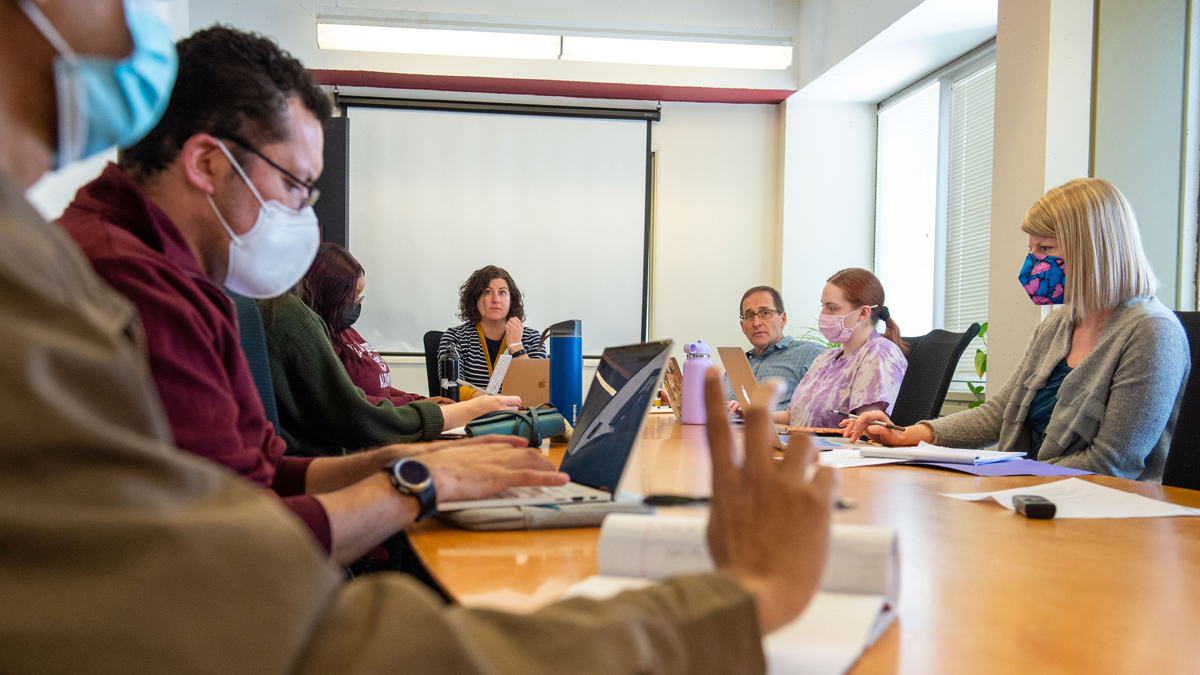
Criminology and criminal justice faculty Breanne Pleggenkuhle, center, Daryl Kroner, next right, and Audrey Hickert, far right, discuss with graduate students research work as part of the state program R3 — Restore. Reinvest. Renew. (Photo by Russell Bailey)
April 27, 2022
SIU criminal justice faculty, students helping to evaluate community organizations
CARBONDALE, Ill. — A research team in Southern Illinois University Carbondale’s criminology and criminal justice program is helping community organizations to assess and improve their effectiveness in providing services to neighborhoods in a large section of Southern Illinois and the Metro East impacted by economic disinvestment, violence and the war on drugs.
Professor Daryl Kroner, Associate Professor Breanne Pleggenkuhle and Assistant Professor Audrey Hickert, along with five master’s and doctoral students and two staff members, are involved in the research effort as part of R3 — Restore. Reinvest. Renew. via the Illinois Criminal Justice Information Authority.
Supported through the state’s Cannabis Regulation and Tax Act, the statewide initiative targets civil legal aid, economic development, reentry, violence prevention and youth development, Pleggenkuhle said. The reallocated funds go to local communities and agencies to target community-level issues and efforts.
Hickert said the research will provide a “fresh set of eyes and an independent perspective” that can improve the work each community organization is doing to keep it moving forward. “When you are in the midst of doing the work, sometimes you cannot see the forest for the trees,” she said.
SIU Carbondale is one of three research teams, with the University of Illinois Springfield and University of Illinois Chicago covering other programs and community organizations in other parts of the state. SIU received $160,000 for the first funding cycle that began in November and runs through end of the current fiscal year on June 30, with plans to reapply for fiscal year 2023.
Working with six sites
The SIU research team is now working with six groups to evaluate overall the types of programs that have been used, the associated challenges and successes, and how the organizations are addressing any obstacles. The actual evaluation of how the implemented plans are working will be in about two years, Kroner said.
The initial phase is about process and understanding how the organizations are implementing their programs. Four of the groups are service delivery sites and actively working, while two others, called assessment and planning sites, are determining their community needs before they also transition into service delivery sites, Kroner said.
The organizations involved are:
- Lutheran Social Services of Illinois, working with the program based in Marion.
- Arrowleaf, formerly the Family Counseling Center, based in Vienna.
- United Way of Greater St. Louis, operating within the boundaries of the East St. Louis School District 189.
- Academic Development Institute, based in Madison County.
- City of Harrisburg.
- Illinois Association of Juvenile Justice Councils based in Centralia.
Sites have program autonomy
Pleggenkuhle, Hickert and Kroner emphasize the programs are offered a great amount of autonomy in how they address goals. Later during the research, the team will talk more specifically to providers and staff about their efforts to determine not only “how things are going but are you reaching whom you want to be reaching” with services, Pleggenkuhle said.
Kroner added that Illinois has moved away from a philosophy that all intervention programs must operate the same.
“When things are too heavy top down and ideas are just forced down, it doesn’t work out,” he said. “There is no buy-in at the local level for it. You don’t have local businesses, local agencies getting excited about this intervention program, and overall for sustainability, it does not work.”
The SIU project will help the organizations succeed on their own terms, the researchers said.
The graduate students are helping with a lot of the groundwork and research and developing the protocols used for active data collection, allowing for hands-on research experience as it unfolds. They will also be observing during virtual meetings with members of the two other research teams in the state and the funding agency, learning the processes involved and gaining valuable experience.
